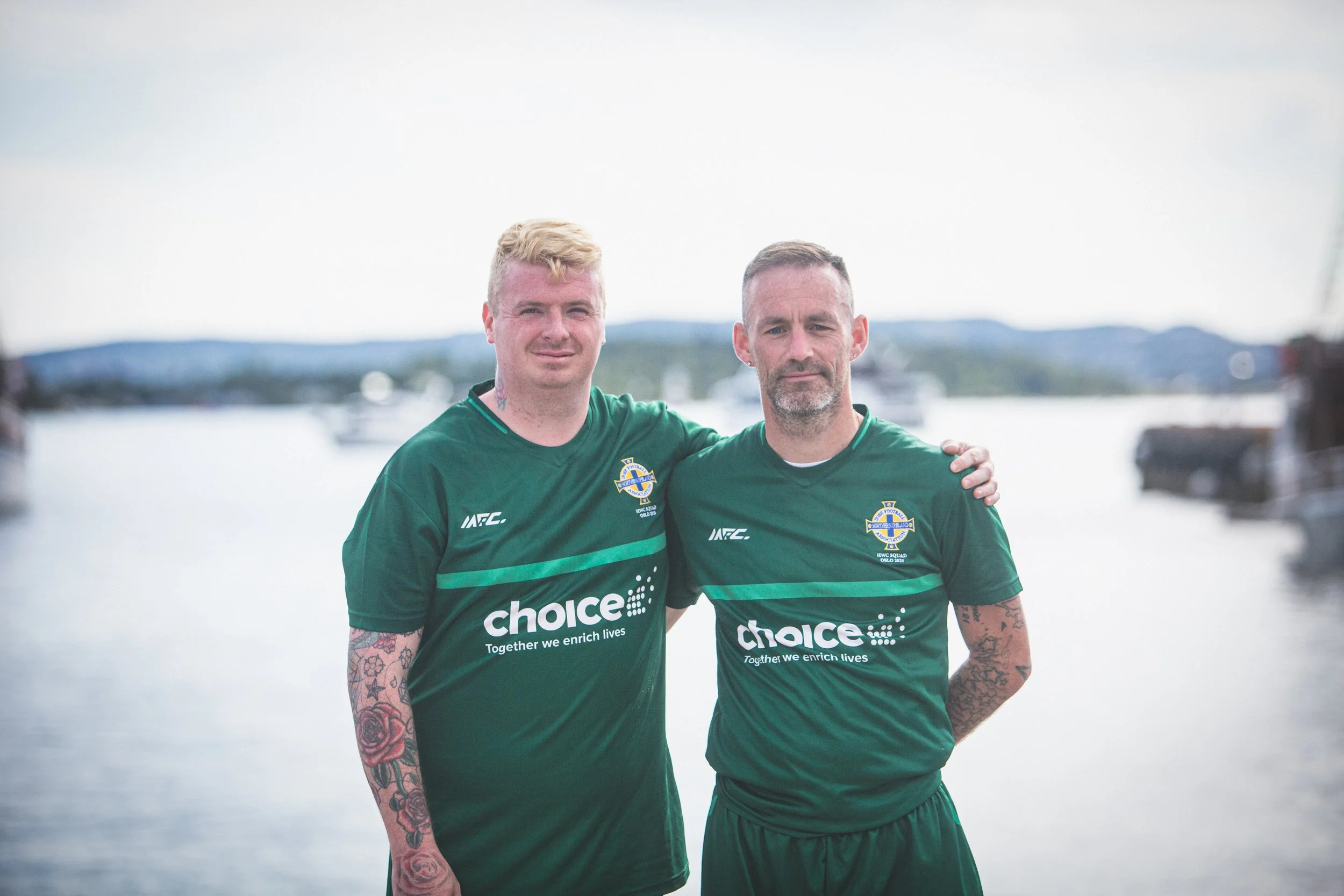Mickey and Mo smelling the roses in Oslo
Mickey and Mo (AKA Michael McCready and Maurice Curtis) were teammates before they were teammates. Both hail from Derry in Northern Ireland, and both played on the same outdoor team as well as in the Derry street soccer program before being selected for the 2025 Northern Ireland Homeless World Cup team.
Mickey had actually been selected for the Northern Ireland Homeless World Cup team when the tournament was first held in Oslo in 2017, but he’d had to politely decline the offer as his first child was due at that time. Almost a decade later he’s getting to realise the opportunity—in the same location as the original.
It’s Mo’s first time round, although like Mickey he’s been part of the Northern Ireland street soccer programme for the better part of a decade. Both men came in as a way of navigating away from drug and/or alcohol challenges.
“Before I got into street soccer, I had a drug and drink problem, and was going through the world just being in debt, falling out with people,” Curtis explains. He heard about the street soccer programme through social media and thought it would be worth trying.
“Ever since, I haven’t looked back. I’ve just been going forward,” he explains. Now straight edge and Christian, he says, “I’m not falling out with nobody. I’m at peace, and I’m alive.” As he terms it: “I met a better friend group. I met a family.”
‘One big family’ is a term you hear around the Northern Ireland team, and it’s by design. The programme is intended to be inclusive and supportive, and teammates come up to congratulate and banter with Mo and Mickey about their just-finished game during our interview.
For Mickey, it’s a welcome shift. He had some challenges with alcohol after a break-up and found football to be the thing that helped him regain his footing. Now 40, he’s physically fit and can play all day, but comments on how he’s noticed how much street soccer also benefits his and others’ mental health.
His children, the one born just before the 2017 tournament, are now old enough to follow his tournament experience at home. “They actually streamed it live on their Facebook. They YouTube me playing every game. So it’s good. They phoned me and my boy was crying back home, and I ended up crying,” he says. His children are incredibly proud of him, he agrees. He adds, “I’m also proud of myself for getting here.”
Mo has a series of tattoos, many of which feature roses. They don’t mean anything specific, he tells me. “I just like roses.” Does he grow them? “No,” he says. “I just like to smell them.” He says it and wears the sleeve so simply, so confidently, that it’s a surprise to hear that he didn’t previously consider himself overly self-assured or outgoing.
“Before [the tournament] I wouldn’t really be up for mixing with different kinds of people, yeah? But now, since I’ve been here, it’s given me more confidence to chat with someone. Say hello, yeah, just have a chat,” he says.
That’s something he and Mickey are now doing plenty of, including showing their opponents great respect. They were stronger than the Australian and Japanese teams they encountered in the tournament’s opening rounds, but credited the teams and championed them on their performance, and congratulated them when they scored goals. “Fair play to them, because there’s not many teams here have boys and girls in one team,” Mickey says of Australia particularly.
Northern Ireland will likely be strong contenders throughout the tournament; a player from another team aptly described them as some of the tournament’s best finishers. But it’s also clear any results will be retained in perspective. For Mo, it’s a first chance. For Mickey, it’s a second. For both it’s a one-time participation given Homeless World Cup rules are that players can only participate in the tournament once. Both are clearly taking full advantage of it.
Words: Fiona Crawford | Photos by John Anderson

